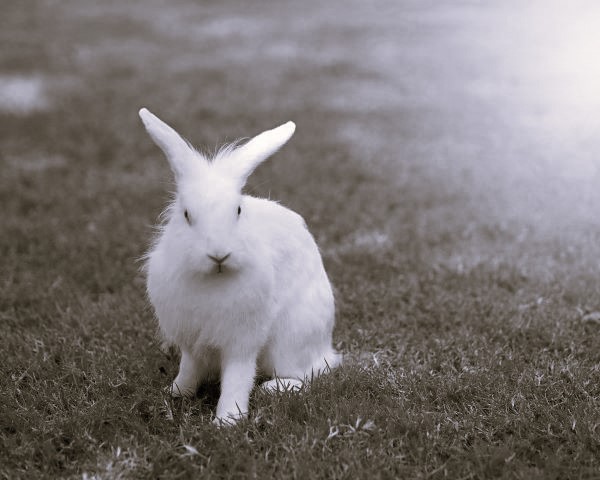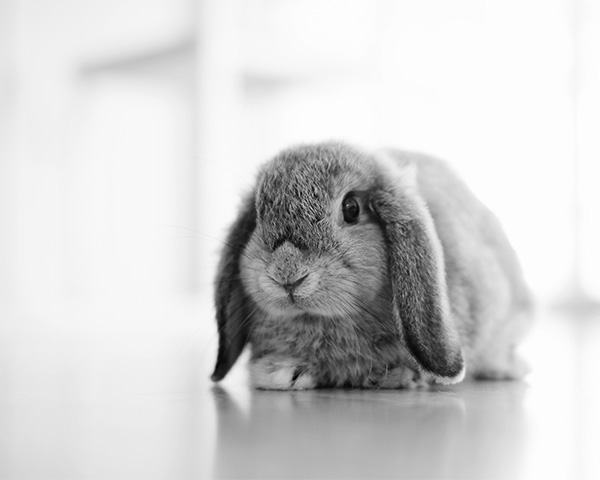New Zealand rabbit breed information and advice
Contrary to the name, New Zealand rabbits were bred in California in the early 1900s. Originally, they were mostly red in colour, but when a red roe produced a litter of white kits with red eyes, the new variation became more popular. They’re now often referred to as New Zealand white rabbits, although they do come in other colours.
New Zealand rabbits have dense, soft fur and upright ears. They’re the inspiration behind Easter Bunny depictions, have been used by magicians in magic tricks, and they’re also a chosen breed for medical research.
If you’re considering welcoming a New Zealand rabbit into the family, read on to learn all about this breed and how to care for them.
New Zealand rabbit facts

| Lifespan | 7 – 10 years |
| How much | £25 – £40 |
| Size | Up to 50 cm |
| Weight | 4 – 5 kg |
| Colours | Red, white, black, blue, mixed |
| Grooming | Brush weekly, trim nails every six to eight weeks |
| Temperament | Docile, calm, intelligent |
| Exercise | Five hours a day to roam and play |
Insurance for your New Zealand rabbit
New Zealand white rabbits are a relatively healthy breed. But that doesn’t mean that they’re immune to health conditions.
Common health problems that can affect New Zealand rabbits include:
Rabbit insurance for your New Zealand rabbit may help towards the cost of vet fees and medical expenses if your bunny is poorly or injured.
Sainsbury’s Bank Pet Insurance
At Sainsbury’s Bank we offer lifetime cover for your New Zealand rabbit. This may cover up to £2,000 in vet bills and medical expenses every year.
You can claim towards things like:
- Dental cover
- Accidents, injuries and poisonings
- Illness
- Physiotherapy
- Medicine
- Advertising and reward cover
- Emergency boarding fees
Lifetime is our most comprehensive insurance coverage. You can take out a new policy for your bunny from eight weeks old – right up until their fifth birthday. We can cover your bunny for the duration of its life, as long as you keep renewing your policy. If you have more than one rabbit or other pets at home, make the most of our multi-pet insurance discount.
Please note that we won't cover any pre-existing conditions, and that terms, conditions, excesses, exclusions and limitations apply.
How to care for a New Zealand white rabbit
Gentle and docile they may be, but New Zealand rabbits need as much care and attention as any other pet. Find out how to keep your rabbit healthy and happy below.
Feeding and nutrition
A rabbit’s diet should mimic what a rabbit would eat in the wild as closely as possible. That means they should get most of their calories from grass or hay, supplemented by leafy greens, vegetables and pellets to make sure they’re getting the right nutrients.
Fruit and treats should be offered sparingly to avoid your New Zealand rabbit becoming overweight. Make sure your rabbit always has access to fresh water, either from a bowl or a water bottle.
Although many people include salt licks in rabbit cages, your New Zealand white shouldn’t need a salt lick if they’re getting enough nutrition in their diet.
Grooming
New Zealand rabbits have shorter fur than some breeds, meaning they are low maintenance when it comes to grooming. Brushing them once a week should be sufficient, although you might need to do it more frequently when they shed more heavily in spring and autumn.
Exercise
New Zealand rabbits are a larger breed, so they need more space than other domestic rabbits. Most commercial hutches won’t be big enough to allow your rabbit to move around, so you may need to invest in a custom hutch. Your rabbit’s enclosure should be at least four times their stretched-out length to give them space to move freely.
New Zealand rabbits need lots of time outside their hutch, whether in a run or enclosure in the garden, or free roaming in the house. They like to explore, and ideally should have at least five hours a day to roam and play.
Training
New Zealand rabbits are intelligent and can be trained to play games, come when they’re called and use a litter tray. Giving them plenty of mental stimulation will keep your bunny happy and entertained. A treat ball or enrichment items like carboard items filled with hay and pellets will satisfy their foraging instinct.
You should handle your New Zealand rabbit every day to make sure they stay comfortable with human contact. Picking them up, stroking them and spending time with them will strengthen your bond and ensure your rabbit remains gentle and docile.
Temperament and behaviour
New Zealand rabbits are laidback, gentle and calm. This makes them ideal pets for families with small children and other pets as they are less skittish and nervous than other rabbit breeds. But it’s important to keep loud noises and sudden movements to a minimum to avoid spooking them.
They are sociable creatures and enjoy the company of other rabbits or their humans, so take the time to interact with them every day to avoid a lonely bunny.
Common health problems
Dental disease
Rabbits’ teeth are constantly growing, so they need to gnaw on a lot of hay to prevent them becoming overgrown. If they do become overgrown, they may need dental treatment to file down the overgrowth. Abscesses can also form beneath the gum, which will need to be surgically removed.
Spinal injuries
Rabbits have delicate spines, and as New Zealand rabbits have particularly strong hind legs, their spines can become damaged from a simple kicking movement. Incorrect handling can also injure them. Anti-inflammatory medication can help with minor injuries, but if the rabbit has become paralysed your vet may advise putting them to sleep, as there is often no cure.
Uterine cancer
This is the most common form of cancer in female New Zealand rabbits. You might notice symptoms like loss of appetite, blood in urine and fertility problems. Spaying can prevent the cancer from spreading to other organs, so vets may advise this if you aren’t planning to breed from your pet rabbit.
Bladder problems
While most mammals excrete excess calcium through the digestive tract, rabbits excrete it through urine. This can result in excessive build-up of calcium which can cause bladder stones.
You might notice your rabbit squealing when passing urine, blood in their urine or a rash from urine being in contact with their skin. Bladder stones can be surgically removed, and bladder infections can be treated with antibiotics.
Arthritis
As a larger rabbit breed, New Zealand rabbits are more prone to developing arthritis. Painful inflammation and stiffness in the joints can cause your rabbit to become less active and spend more time lying in awkward positions rather than stretching out.
Arthritis can happen naturally with age, so older rabbits are more likely to show signs than younger ones. Anti-inflammatory medication can help your bunny cope with the condition better.
So, is a New Zealand rabbit right for you?
Gentle, placid and intelligent, the New Zealand rabbit is a popular pet for families. They are equally happy living indoors or out and have relatively low care needs compared to many other pets.
If you’re looking for a cuddly, low-maintenance pet that the whole family can shower with affection, a New Zealand rabbit might be right for you. Whether you opt for the distinctive white fur and red eyes, or another colour combination, you’re sure to get a friendly and companionable pet.
Frequently asked questions
Are New Zealand rabbits calm?
Yes, New Zealand rabbits are a calm breed compared to a lot of other domesticated rabbits, which can be skittish. It’s for this reason that they were often used in magician shows, as they could be trusted to stay still inside the magician’s hat, or else hidden from view to surprise the audience.
Can New Zealand rabbits live alone?
Rabbits generally are social creatures, and in the wild they live communally in large warrens. Domesticated rabbits can live alone, but it’s important to ensure that they get plenty of socialisation with their humans every day so they’re not lonely. Otherwise, it’s a good idea to keep several rabbits together, as long as they’re neutered.
How big can New Zealand rabbits get?
New Zealand rabbits are a larger rabbit breed and can reach over 5kg in weight. Females tend to be bigger than males, weighing slightly more on average.

Browse our guides
Choose from our list of helpful guides and information

Explore rabbit breeds
Find out how to keep your rabbit healthy and happy

Cat breed guides
How to care for your cat, common health problems and more
Terms and conditions
Important information
* The discount is based on information related to you and the Sainsbury’s and Sainsbury’s Bank transactions linked to your Nectar account. For more information on how we use your data, go to sainsburysbank.co.uk/privacy
Sainsbury's Bank plc, Registered Office, 33 Holborn, London EC1N 2HT (registered in England and Wales, no. 3279730) is authorised by the Prudential Regulation Authority and regulated by the Financial Conduct Authority and the Prudential Regulation Authority (register no. 184514). Sainsbury's Supermarkets Ltd is an appointed representative of Sainsbury's Bank plc.
Sainsbury's Bank plc acts as an introducer to Pinnacle Insurance plc who is authorised by the Prudential Regulation Authority and regulated by the Financial Conduct Authority and the Prudential Regulation Authority (register number 110866). Registered Office: Pinnacle House, A1 Barnet Way, Borehamwood, Hertfordshire, WD6 2XX. Sainsbury’s Bank plc and Pinnacle Insurance plc are not part of the same corporate group.
